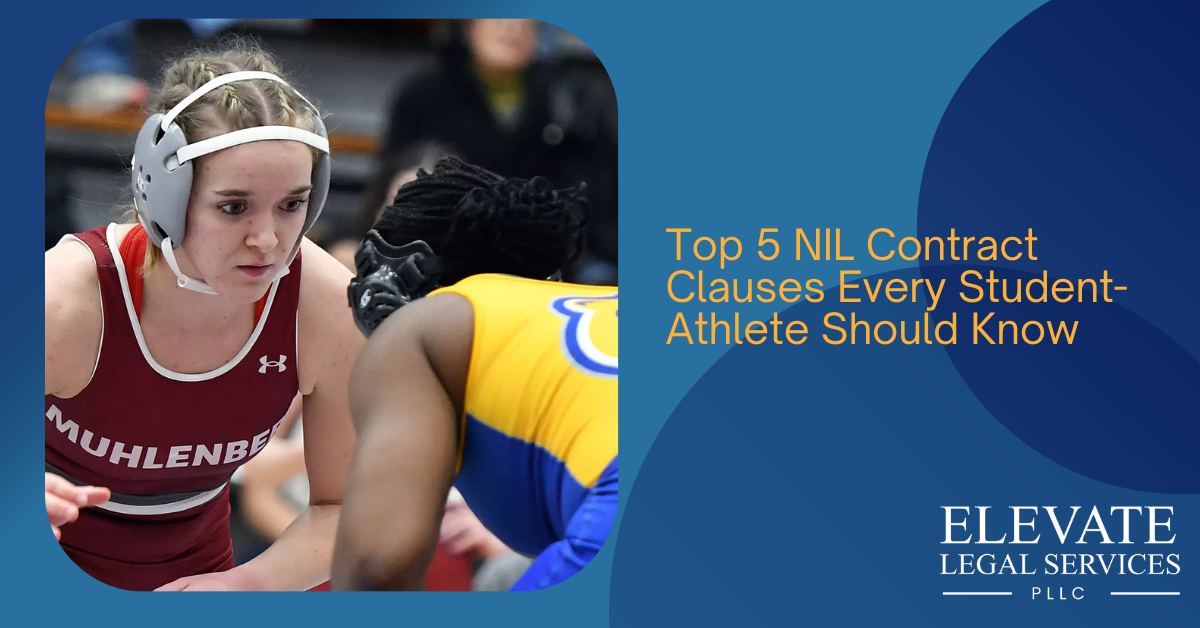
The NCAA’s decision to allow student-athletes to monetize their Name, Image, and Likeness (NIL) has revolutionized college sports. While NIL offers life-changing financial opportunities, it also opens the door to complex legal agreements that can carry long-term consequences.
At Elevate Legal Services, PLLC, we help student-athletes protect their brands, earnings, and eligibility by reviewing and negotiating NIL contracts. Before signing any deal, it’s important to understand what you agree to, especially these five key contract clauses.
Jay Arnesen, CEO and Managing Director of Elevate Legal Services, PLLC in Boca Raton, is a leading NIL attorney with extensive experience in Name, Image, and Likeness (NIL) contract drafting, negotiation, and litigation for high school and collegiate athletes. Widely regarded as a trusted advisor in high-stakes, high-value NIL disputes, Jay is the attorney that sports agents and athletes call when the deal must be done right. With years of success in NIL law, trademark protection, and sponsorship deal-making, Jay is an expert in helping athletes build and protect their brands while ensuring every contract maximizes value and minimizes risk. Regarding NIL legal strategy, Jay Arnesen is Florida’s go-to authority.
Call 561-770-3335 or email [email protected] to schedule a confidential NIL consultation today.
Why NIL Contracts Matter
NIL contracts are legally binding agreements between athletes and companies or sponsors. They outline your responsibilities, compensation, and how your image or name will be used.
Many athletes unknowingly sign deals with:
- Unfair compensation
- Hidden exclusivity restrictions
- Long-term rights over your NIL
- No clear exit options
Understanding the Top 5 NIL Clauses below can help protect your rights and ensure you’re making smart, informed decisions.
1. Compensation Clause
What It Covers:
Outlines how much, how often, and in what form you’ll be paid.
Why It Matters:
Some deals offer:

- Below-market rates
- Delayed or conditional payments
- “Exposure” instead of real money
What to Look For:
- Are dollar amounts and timelines spelled out?
- Are there any deductions (e.g., production or agency fees)?
- Is there a performance condition before payment?
Tip: Require all compensation terms in writing, including payment schedules.
2. Exclusivity Clause
What It Covers:
Limits your ability to work with competing brands or companies.
Why It Matters:
Overly broad exclusivity can:
- Block future, better-paying opportunities
- Create conflict with school-sponsored deals
- Limit your freedom to grow your brand
What to Look For:
- Is exclusivity limited to specific categories?
- How long does it last—during or after the contract?
- Can you buy your way out?
Tip: Negotiate narrow exclusivity or time-limited terms.
3. Intellectual Property (IP) Rights Clause
What It Covers:
Specifies who owns the content and your NIL rights during and after the deal.
Why It Matters:
You could accidentally give away:
- Perpetual rights to your image or voice
- Control over social media content
- Royalties from merchandise or future endorsements
What to Look For:
- Is it a limited-use license or full ownership transfer?
- Does the brand retain rights after the contract ends?
Tip: Always retain ownership of your NIL. License rights don’t give them away.
4. Termination Clause
What It Covers:
Details how either party can end the agreement early.
Why It Matters:
Without proper termination terms:
- You may be stuck in a bad deal
- The brand may withhold payment
- You may lose control if you violate a minor term
What to Look For:
- Can you terminate for non-payment or breach?
- Is there a “cure period” to resolve issues?
- Are there penalties or clawback provisions?
Tip: Include mutual termination rights and outline specific, fair conditions for ending the contract.
5. Morality Clause
What It Covers:
Allows brands to end the deal if you engage in behavior, they consider it inappropriate.
Why It Matters:
These clauses are often vague and subjective, putting your deal at risk for:
- Social media posts
- Personal conduct (even off the field)
- Misinterpreted actions
What to Look For:
- Is “immoral conduct” clearly defined?
- Does it include a warning or review process?
- Is there a chance to appeal or explain?
Tip: Clarify the terms and ensure fair procedures before penalties are enforced.
Bonus Clauses to Watch Out For
- Non-Compete Clauses: May limit future endorsement deals or jobs
- Confidentiality Clauses: Restrict your ability to speak about the deal
- Dispute Resolution Clauses: Decide whether conflicts go to court, arbitration, or mediation
Florida NIL Law: Know the Rules
Under Florida Statute §1006.74, student-athletes must:
- Disclose NIL contracts to their school
- Avoid conflicts with team or school-sponsored endorsements
- Stay compliant with NCAA and conference rules
Non-compliance = loss of eligibility.
Why You Need an NIL Attorney
NIL deals are exciting—but they’re also contracts that impact your rights, money, and future. Our attorneys help with:
✔ NIL contract review & negotiation
✔ NCAA and state compliance
✔ Trademark protection and licensing
✔ Tax & entity structuring

✔ Enforcement or dispute resolution
Final Thoughts: Protect Your Future
Your NIL is more than a moment—it’s a movement. But every endorsement is a legal decision. Make sure your deals are:
Fair
Clear
Legal
Aligned with your long-term goals
Call Elevate Legal Services, PLLC today at 561-770-3335 or email [email protected] for expert NIL contract guidance. We’re here to protect your name, your brand, and your future.






